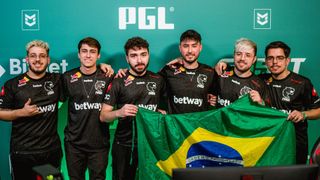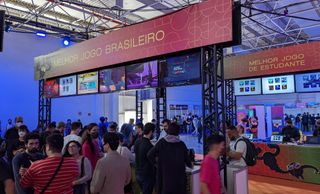You may not know any Latin American game studios by name, but that's about to change
Expect some of 2023's brightest indies to come from Brazil and its neighbors.

The Brazil International Games Festival, aka BIG, is not an E3 or a Gamescom—the games at the event didn't make for earth-shattering international headlines this year. But that was irrelevant for the people I spoke with at the event, who were clued in to how much potential is bubbling just under the surface of the Latin American gaming scene.
Brazilian game developer Mark Venturelli, who did make headlines with a viral talk on "Why NFTs are a nightmare," said local developers are now getting investments from Epic and Microsoft, and there are prospective 200-person studios opening in Brazil in the near future. Sony, Microsoft, Nintendo, and Epic were all present at BIG this year, a far cry from the much smaller, completely indie festivals of past years.
"Right now, because of the instability in Europe, investors are looking at South America like, 'is this the next big thing?'" Venturelli said.
Developer Leonardo Castanho is head of a small Brazilian team making Astrea, a 'dicebuilder' in the vein of Slay the Spire. "Indie games are getting attention, but the industry still needs to evolve a little bit more to get competitive," Castanho told me. "But if you compare games from this year to 2019, there's an evolution. The games from Brazil are much better."
It's one thing to hear that from a local developer, but it's another to hear it from multiple indie publishers, too. I spent time with several publishers who were at BIG to scout for games, and all of them were optimistic about the projects they were seeing in private. A few games I played at BIG were promising, but the ones you're going to be playing in a couple years?
They may well put studios on the map.
"Hands down, the quality of the projects themselves has grown significantly," said David Martinez, co-founder of Sable publisher Raw Fury. "LATAM has accrued a lot of knowledge over the years and devs readily share these insights with each other. It's a tight-knit community that has caught up pretty quickly to the decades-old scenes in North America and Europe both in talent and in scope. Teams of 2-3 people I met at BIG 2017 have transformed into teams of 20-30 in 2022. Seeing the exponential growth of the region has been nothing short of astounding."
The biggest gaming news, reviews and hardware deals
Keep up to date with the most important stories and the best deals, as picked by the PC Gamer team.
Bobby Wertheim, VP of partnerships of The Ascent publisher Curve Games, said much the same thing. "This year, it felt as though people presenting their games were far better prepared and excited to talk to potential publishers/investors; they had excellent presentation material, videos and even builds of the game to showcase to us," he said. "Most importantly, though, the games have considerably improved in quality. I’ve always felt the teams who attend BIG (mostly Brazilian and some LATAM studios) were working on innovative, unique games that had the potential for break-out hits; this year, the games I saw felt far more compelling and were great fun to play."

Dr. Matthew White, the founder of cozy game label Whitethorn (publisher of last year's postal vacation adventure Lake), had a packed schedule at BIG. "The developers have this massive drive, willing to bend over backwards to show you titles," he said. "We saw a whole bunch that ran the gamut from first-ever indie game to established studios with existing IP doing something new—tons of variety. I think the biggest drive for us is always the variety. There are certainly several that piqued our interest."

For more from BIG, read about what it means to be a PC Gamer in Brazil
White wasn't the only publisher I talked to who commented on the range of games in development they saw at BIG. While it's impressive that the tiny indies of half a decade ago have successfully grown bigger studios, there's also something special about the way BIG gets less experienced developers in front of potential publishers, too.
Meetings at the festival are essentially speed dating for game pitches: a hundred small tables are crowded into a long room, with 20 minutes on the clock for each sit down. Find your numbered table, shake hands and make your case; before long a tone will ring out over the speakers. Time to shuffle.
"I got some pitches that ranged from $1 million or so down to like $10,000," said Ted Hentschke, head of production for horror publisher DreadXP. "It was cool to be able to meet truly indie devs in what’s typically a higher barrier for entry environment. There’s a certain sliding scale that 'indie' has been going down for some time as budgets grow and grow, and a new batch of indie has come from places like itch.io to fill that truly indie micro-budget void. But in the larger industry these titles are still largely overlooked. So to go to a place where I can hop from an 'AA' indie pitch to something made by two guys in a few months is a truly unique opportunity."

Hentschke got more out of BIG than just a game he's interested in signing: he also met a developer he wants to integrate into future DreadXP projects. Wertheim said there were "more than a few" games from the show he hoped to publish at Curve. And if Martinez signs the games he hopes to for Raw Fury—a couple of which I caught quick, impressive glimpses of—I suspect they'll make a splash at a future E3.
"I don't want to jump ahead of myself, but I saw some extraordinary games I'd really like in our portfolio ranging from the cutest co-op brawler I've ever seen to a savage FPS that must've been created during a fever dream," he said. "The spectrum of games in development was staggering."
After two years as an online-only event, there was a vibe of excitement at BIG from everyone meeting, and pitching, in person once again. "I feel like this year is going to be a shift here in Brazil, for the better," Mark Venturelli told me.
"We had a pretty rough 2-3 years because of the pandemic. Brazil always had a brain drain issue—people who are from my generation are in big companies overseas, working in the Valves and Blizzards and Ubisofts of the world. People who get really good at making games here, they go overseas. During the pandemic that got a lot worse, and that also made it harder for new studios to do their thing… But the future's bright now, I'm sure of it."

Wes has been covering games and hardware for more than 10 years, first at tech sites like The Wirecutter and Tested before joining the PC Gamer team in 2014. Wes plays a little bit of everything, but he'll always jump at the chance to cover emulation and Japanese games.
When he's not obsessively optimizing and re-optimizing a tangle of conveyor belts in Satisfactory (it's really becoming a problem), he's probably playing a 20-year-old Final Fantasy or some opaque ASCII roguelike. With a focus on writing and editing features, he seeks out personal stories and in-depth histories from the corners of PC gaming and its niche communities. 50% pizza by volume (deep dish, to be specific).
Most Popular

